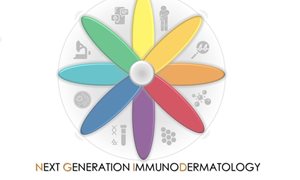 Cytotoxic natural killer (NK) cells are specialized in discriminating potentially dangerous cells and healthy “self” cells. For this reason, NK cells have classically been associated with antiviral and antitumor activity, but recent work suggests that they are also essential for ensuring healthy pregnancy.
Cytotoxic natural killer (NK) cells are specialized in discriminating potentially dangerous cells and healthy “self” cells. For this reason, NK cells have classically been associated with antiviral and antitumor activity, but recent work suggests that they are also essential for ensuring healthy pregnancy.
Publication: link
Pregnancy is considered an immunological conundrum. Although the developing fetus is foreign to the mother, i.e. 50% of its characteristics come from the father, it will be tolerated by the maternal immune system during pregnancy. Each month, during the menstrual cycle, the uterus prepares itself for pregnancy by a large influx of leukocytes in the endometrium (i.e. the mucosal lining of the non-pregnant uterus). After fertilization and implantation of an embryo into the endometrium, the number of leukocytes increases even further. Without implantation, the endometrial lining and its leukocytes are shed during menstruation. Natural killer (NK) cells are abundantly present in the human endometrium and will make up 70% of the uterine leukocytes during the first trimester of pregnancy.
NK cells are classically defined as innate immune cells that are specialized in recognizing and killing of altered self-cells, i.e. tumor transformed or virus-infected cells. In the uterus however, NK cells don’t exhibit this killing capacity but display an important regulating role for successful pregnancy. After implantation of the embryo, NK cells will come in close contact with fetal-derived extravillous trophoblast cells (EVT). These NK cells will promote EVT invasion and spiral artery remodeling, thereby ensuring a correct formation of the placenta and an adequate blood supply to the fetus.
NK cell activity is regulated by different NK cell receptors (NKR), e.g. KIR and CD94/NKG2. NKR expression on NK cells in the placenta is affected by maternal HLA-C genotype and biased towards KIR2D expression. However, little is known about the regulation and composition of NKR expression on endometrial NK (eNK) cells. As NK cell activity is particularly relevant at the time of implantation, analysis of NKR expression may yield insight in the role of NKR+ eNK cells for successful pregnancy.
In this study, eNK cells, obtained from menstrual blood, were immunophenotyped for NKR expression with 10-color flow cytometry, and compared to peripheral blood NK (pbNK) cells of the same female.
We showed that, within the same female, the NKR expression profile of eNK cells does not differ over consecutive menstrual cycles. The NKR repertoire of eNK cells was clearly different from pbNK cells, with eNK cells co-expressing more than 3 NKR simultaneously. In addition, outlier analysis revealed 8 and 15 NKR subpopulation expansions in eNK and pbNK cells, respectively. In contrast to the pbNK cell population, the expansions present in the eNK cell population were independent of prior cytomegalovirus (CMV) infection and HLA-C genotype. Moreover, the typical NKG2C imprint induced by prior CMV infection on pbNK cells was not observed on eNK cells from the same female, collectively suggesting a rapid local turnover of eNK cells and/or a distinct licensing process. Follow up studies will focus in more detail on the mechanisms of eNK cell function.
Taken together, our data reveals that NK cells in the pre-implantation endometrium appear to have a dedicated tissue-specific phenotype, different from pbNK cells. This may indicate that eNK cells are finely tuned in ensuring a healthy pregnancy. Studying the endometrial NKR repertoire of women with pregnancy related problems, such as recurrent miscarriages, could provide clues to understand the pathogenesis. Perturbations in the endometrial immune cell composition could lead to the discovery of pregnancy-success related biomarkers and possibly even treatment options.
Related news items

Joyce Aarts and colleagues published in Scientific Reports about the role of TGF-β1 in (experimental) arthritis
30 March 2022Joyce Aarts, theme Inflammatory diseases, and her colleagues published in Scientific Reports, that local inhibition of TGF-β1 signaling improves Th17/Treg balance but not joint pathology during experimental arthritis.
go to page
Large NWA ORC grant awarded for national skin research: Next Generation ImmunoDermatology
23 March 2022Research for better treatment methods for chronic skin diseases.
go to page
NWO OTP grant to investigate fibrotic diseases with organ-on-a-chip technology
22 December 2021 Wouter Verdurmen & Peter van der Kraan have been awarded with a grant by the Netherlands Organisation for Scientific Research (NWO-OTP) to develop and employ innovative organ-on-a-chip models to investigate fibrotic diseases, with a particular focus on systemic sclerosis. go to page
RIMLS awards call for nominations
19 October 2021 RIMLS awards several prizes to stimulate and honor our (young) researchers. Upcoming awards are Supervisor of the Year, Best Master Thesis, Best Publication, Best Image and more. Send your nominations now before 24 November 2021. go to page
Best presentation award for Felicitas Pardow at the European Epidermal Barrier Research Network
28 September 2021 During the annual meeting of the European Epidermal Barrier Research Network (E2BRN) recently, Felicitas Pardow received the best presentation award. go to page
